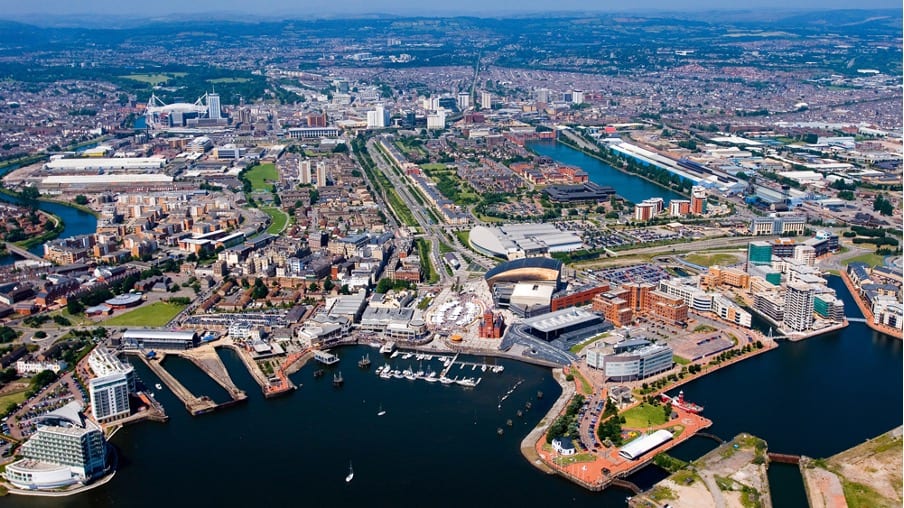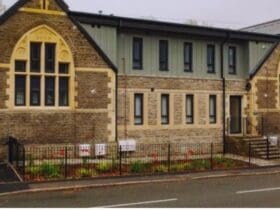Cardiff residents, business people and stakeholders are being invited to join a conversation and engagement exercise on the future of their city in a post-pandemic world.
The launch of the city’s Greener, Fairer, Stronger recovery and renewal strategy will take place on Thursday, June 3, from 9.30am-11am, and an open invitation is being extended to anyone interested in Cardiff’s future to join in.
A world-leading expert on cities, Dr Tim Williams, will be joined by the leader of Cardiff Council, Cllr Huw Thomas, and Cardiff University’s Head of School of Geography and Planning, Professor Gill Bristow, as they kick start a series of conversations and public engagement sessions about the challenges and opportunities Cardiff faces in a post-pandemic landscape.
The first ‘conversation’ will take the form of a webinar and anyone who wishes to join can do so by registering to attend here.
Speaking before the event Dr Williams, who has 20-years-experience working nationally and internationally developing urban and city management policies for major metropolises like London and Sydney, and who has written a report on the future of Wales’ capital, says Cardiff is well-positioned to take advantage of the many opportunities a post-Covid landscape will bring.
Writing in the Taking Cardiff Forward After COVID-19 report, Dr Williams, says: “Cardiff entered this global crisis in good shape and it can emerge, with the right spirit, strategy, collaborations and innovation, even stronger. In so doing it can provide even more benefits for both its own community and that of the City Region. Cardiff can succeed after Covid, delivering a better standard of life for its residents alongside an economic programme for a ‘green’ and technology-based recovery.
“There’s an opportunity, galvanised by Covid-19, for Cardiff to become an exemplar for a city of its size. Building on its established and continuing strengths, the ambition it has to succeed, the skills and imagination of its people and the leadership it has already shown, Cardiff will not just ‘bounce-back’ – of that there is no doubt – it will ‘bounce-forward’ as the council restarts what it can do but also rethinks what it needs to.”
The 28-page report was commissioned by Cardiff Council specifically to challenge the authority and to sharpen its own strategies and interventions for a successful post pandemic recovery.
It covers a wide range of measures which it recommends the council consider, including:
- A key focus must be placed on the future of the city centre making it attractive to visitors, workers and businesses in a post COVID landscape;
- Cardiff must retain and build on its status as a major events city for both sports and culture;
- Cardiff must ensure it remains a healthy city to live in with clean air, high quality public spaces, parks and green areas;
- Cardiff must use the momentum around the ‘Green’ agenda, and capitalise on the Tech and knowledge sectors already surfacing in the city, to attract investment and deliver jobs;
- ‘Liveability’ is central to what the city will need to be in order to retain and to grow and to attract talent and investment.
- Building a fitting public transport network which will enable the city to be criss-crossed with ease is essential.
Dr Williams, writes: “There is a pressing need for Welsh Government to support its capital city through this transition and to work even more closely with the council on shared approaches to innovation and investment.
“Cardiff is the ‘urban goose’ that Wales has that can lay the kind of golden egg countries need and anticipate from their cities. There is no alternative.
“It’s vital going forward that Welsh Government, because of the importance of the city and its challenges and opportunities, see the council as ‘first among equals’ in terms of governance partners. In the competition for investment and talent the successful cities will be those that have the necessary power to make, coordinate and fund decisions, regarding key issues and assets, such as the future of transport in the city or resources for area regeneration or estate renewal.
“The strategies for maintaining and renewing Cardiff’s Central Business District and knowledge economy and for leveraging Cardiff’s big city projects – Central Station, the Bay, St Mellons Parkway, the emerging innovations districts, the new Valleys Metro and network in Cardiff – these projects of scale, require a mature and imaginative partnership between Cardiff and the Welsh Government, with each putting skin in the game, for mutual and indeed national benefit. Internationally, the best results are coming when governments embrace collaboration with their key cities.”
Cardiff Council leader, Cllr Huw Thomas, said: “We have used Dr William’s report to help inform and shape our thinking and our strategies for leading Cardiff into the post-pandemic world. This council is determined to deliver the best possible outcomes for all its residents. We have worked up plans which we believe will help Cardiff recover from the pandemic, plans which can benefit everyone who lives and works here. We want to start a new Capital Ambition conversation with citizens and city stakeholders on how we can shape and lead the recovery and renewal of Wales’ capital city. We want to build a new Cardiff, a city which works for everyone who lives in it, and which works for Wales. A city which will continue to grow and to flourish as it has over the past 20 years. A great city to live in and one that can continue to power Wales’s economic success.”
A programme of engagement with the public, city stakeholders and publicservice partners, will be conducted over thesummer following on from the launch event on June 3, with the results reported back to Cardiff Council’s Cabinet to consider in the autumn.
Dr Williams has more than 20 years’ experience workingat the highest level in both the private and public sectors on housing and urban development. He was CEO of the Thames Gateway project in East London and is considered to be a leading planning expert in housing in Australia and the UK, where he advised five UK housing ministers.
Gill Bristow is Professor of Economic Geography and Head of School of Geography and Planning at Cardiff University. She undertakes research on city and regional economic resilience, and is a member of the UK2070 Commission, an independent inquiry into the UK’s city and regional inequalities.
Ten things Dr Williams’ report says Cardiff has going for it
- Cardiff is Wales’s political, cultural and business capital
- It is one of the UK’s Core Cities giving it important lobbying potential
- The city has a significant pipeline of major development projects coming forward
- Cardiff has a continually improving, attractive, walkable and cyclable public realm
- A growing status as Wales’ national capital with a cosmopolitan community
- A resurrected, and still regenerating, Bay area
- A high-performing university sector with research excellence, and some of the most improved schools in the country
- Cardiff has at least two emerging innovation districts in digital, fintech and business services
- A unique capacity to host major sporting events at the heart of the city
- An impressively renewed and renewing multi-purpose and diversifying city centre with Wales’ only Central Business District
Five things Dr Williams’ report says Cardiff needs
- The city’s irreplaceable role for Wales needs to be recognised by Welsh Government
- Growth needs to be inclusive and shared with all communities across the city
- An efficient, modern, public transport system is a priority
- Public health and wellbeing will be central to creating a successful city
- The green agenda should play a key part in creating a new Cardiff identity








Leave a Reply
View Comments